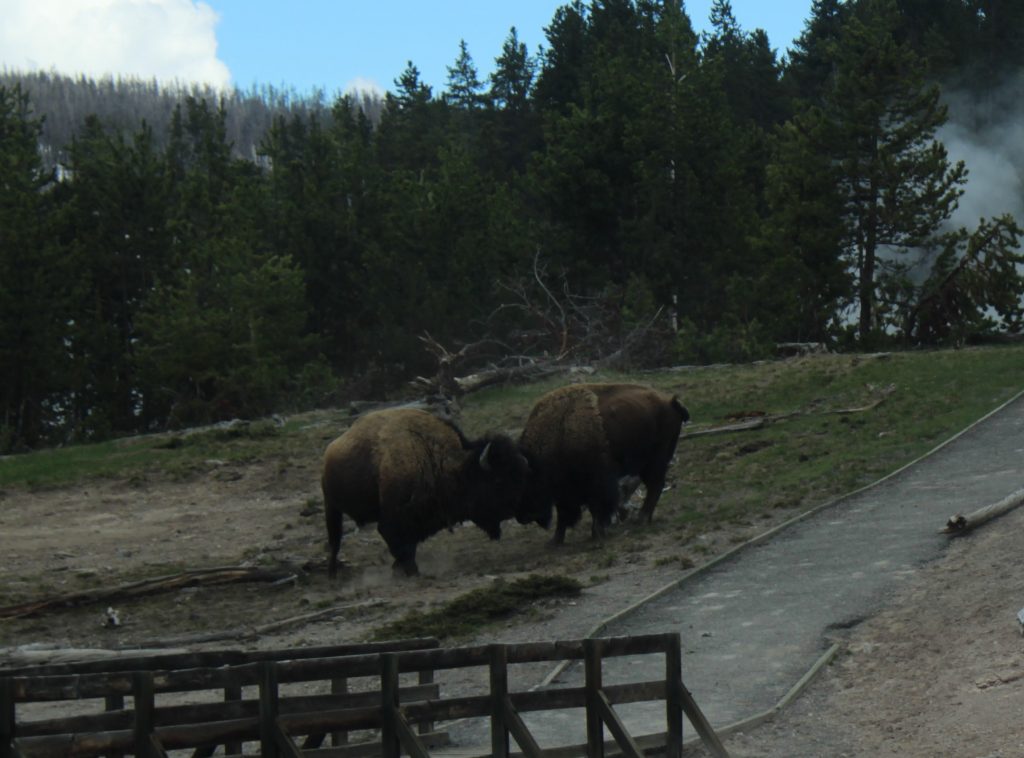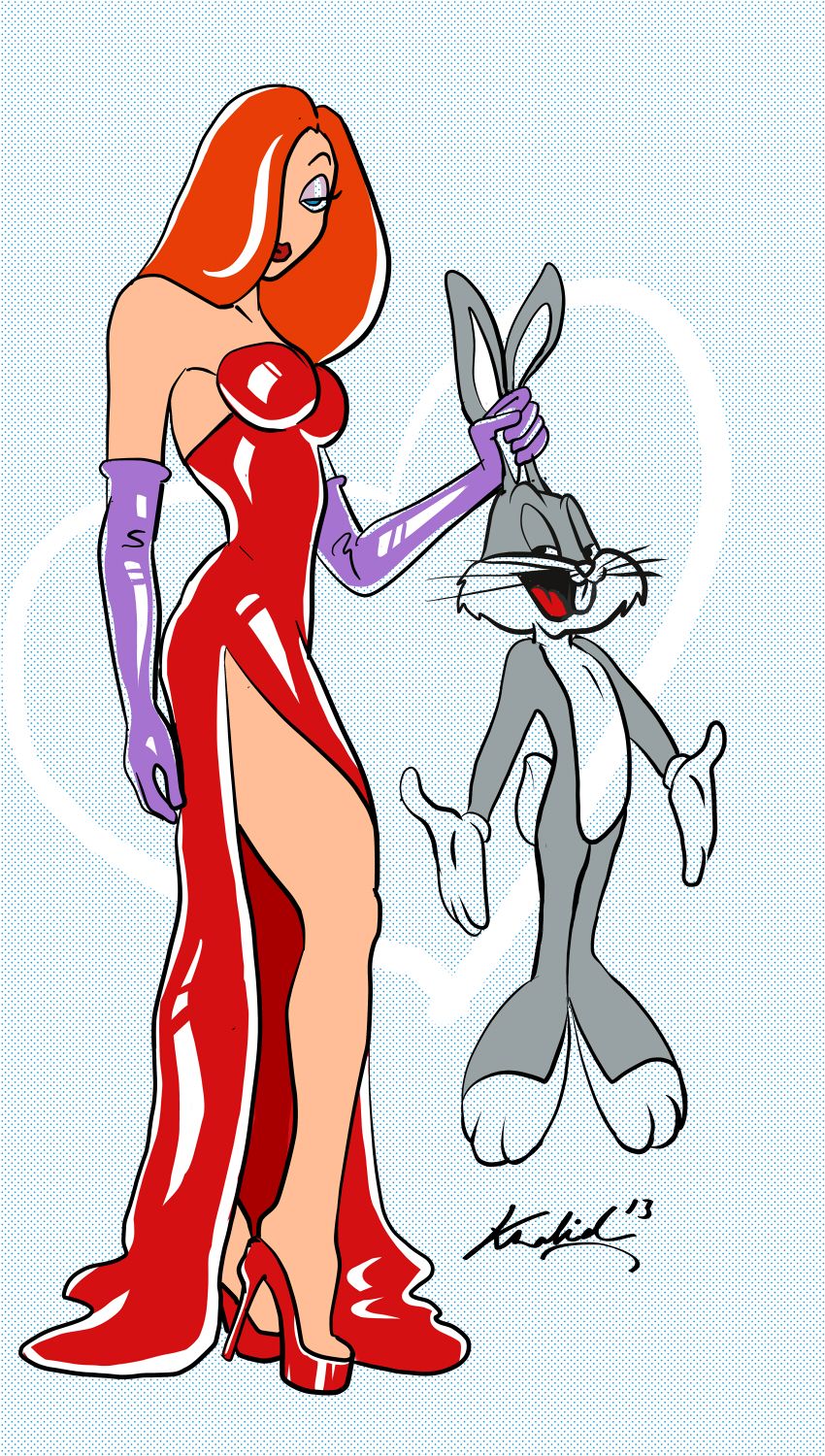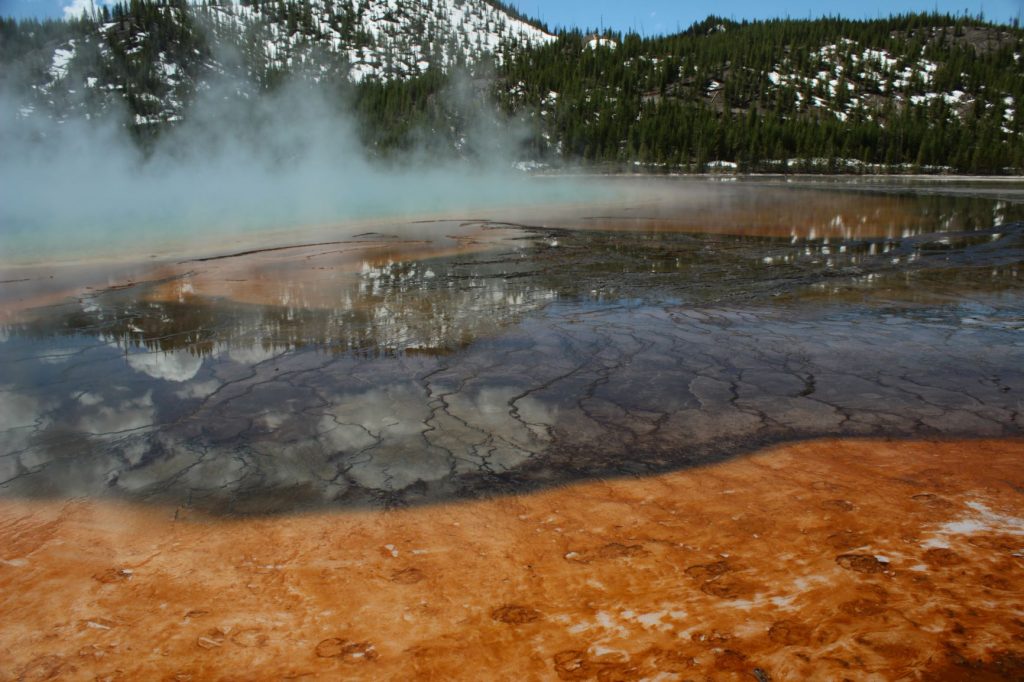
When walking about the geothermal features there are lots of signs that tell you to stay on the walk ways. Seems if you don’t do this, not only will you damage the area but unlike other natural wonders, the area may damage you. Geothermal areas are hot, damn hot. Hot enough to give you scalding burns. Hot enough to melt your dog if you are stupid enough to let it off the leash. I can accept this, it makes perfect sense. What I have trouble with is that buffalo apparently don’t read the signs, or so I thought.
At the edges of nearly every pool of boiling hot water were buffalo, buffalo tracks, and buffalo meadow muffins. Sometimes there were even tracks and muffins in the pool. Yet in four prolonged trips to the park, I never once saw a three legged buffalo or a stewed buffalo in a hot spring. The only thing I can conclude from this is that buffalo are tough bastards who do not feel pain and when severely injured are totally devoured by the rest of the herd. This conclusion is reinforced by the frequent warning signs about leaving the wildlife in the park alone and the admonition to stay 40 feet away from the buffalo as they can head butt you with three point distance and accuracy. The dilemma is what to do when you are almost to the paint pots in this clearly marked geothermal area and a buffalo is using the boardwalk for a pillow. I could have gone back, but the artist paint pots were one of the most fun things in that Walt Disney movie I had seen so many years ago. I could step off the path and possibly get scalded. I could throw rocks at the buffalo but there is probably some rule and hefty fine if caught. And even if I got away with it, I would never hear the end of it from Judy. My last option was to hold my breath and tiptoe past the buffalo’s nose in the hopes that it was a sound sleeper. Which is what I did. That Judy did the same was somewhat of a surprise. A woman who runs screaming from a three inch garter snake in her flower bed is fearless when confronted by a ton of buffalo. Turns out that the paint pots were worth the risk as we pointed and laughed for a half hour at the funny faces the mud seemed to make whenever the paint pots farted. Only problem was that the way in was also the only way out and buffalo are noted for their long naps.
My purist friends are always correcting me. They are not really buffalo, they are BISON. Fuck that. I know a buffalo when I see one. Native Americans and John Wayne called them buffalo and that is good enough for me. Besides, he was called Buffalo Bill, not BISON Bill, though that would be a good name for a male stripper if I was into that shit.
On our last trip to the park I discovered that buffalo are sticklers for enforcing park rules. Our neighbors, Erich and Wendy went with us on that trip at the end of May. Snow was still on the ground and Yellowstone lake was totally iced over. Not a lot of animals had moved up from the lower elevations at that time of year, but a couple of bull buffalo were hanging out at the mud volcano, our first stop on a week long trip. Erich and Wendy decided to hike up the trail from the lower geothermal features to the upper ones. It was a loop trail going straight up then looping around the hill top and straight down to the trail end about 100 yards from where it had begun. Although my mind wanted to climb up the hill and stairs with them, my 71 year old arthritic knees disagreed. Besides the two gigantic bulls were putting on a heading butting show better than anything I had seen on pay-for-view wrestlemania and it was for real. Judy and I watched the show for about 30 minutes as the two pushed each other around from the start of the trail loop to the other end of it. After a bit, the two quit butting heads and began grazing in the new grass. Only problem was they were on the trail, the very same trail that Erich and Wendy were coming down the hill on. Within sight of the parking lot Erich found himself trying to stare down a hairy beast who had no intention of yielding the right of way. Erich, a bit winded after hiking a mile up and down a hill at 7500 feet elevation, thought he could go off the trail a bit and side step the horns of death. As soon as he put a foot off the trail the bulls head snapped up and snorted. Erich gingerly got his foot back on the trail and the buffalo put its head down to graze. Erich tried the same maneuver again with the same but slightly more empathic response from the buffalo park ranger. The snort language of the buffalo is extremely hard for a non-buffalo speaker to enunciate, but it is easily understood. “Stay on the trail! Can’t you read the fucking signs, you dumb shit tourist.” Erich and Wendy turned around and hiked back up the trail.
Most of the year the central portions of the park are infested with buffalo. After a while you just get used to them. They come into campgrounds, hang out next to the Old Faithful Inn, and in general ignore the people pointing and snapping pics of them as long as they don’t bonk them on the head for a better pose. However, they are not courteous. Leaving our campsite one morning we were stuck for two hours in a traffic jam that moved at a leisurely walking pace. Eventually we heard on our CB radio that the reason for this snarl was a herd of buffalo walking down the middle of the road and refusing to take the frequent slow vehicle turn outs. Using my vast knowledge of animal behavior learned from watching B-westerns, I could tell that the traffic was moving just slightly faster than the self absorbed herd as the buffalo shit and urine on the road was getting fresher the farther we went. I was actually looking forward to driving slowly though the herd, but just as we caught up with them, a meadow opened up on the side of the road and they meandered off.
Other animals also cause traffic jams in the park. These occur when a herd of something other than buffalo appears next to the highway and all the tourists stop to take pictures. I have been in moose jams, antelope jams, and even got held up for a few minutes by a coyote begging for scraps. After a while you get a little blasé about stopping to see elk for the fifth time. Some people even react with displays of animal/tourist induced road rage. We were stopped at a three elk jam watching the biggest elk of the three as it showed off its rack to the admiring tourists. A few minutes into this a frustrated driver started beeping his horn to clear the road. I would have turned around and glared but was too busy laughing at the elk who put the insensitive jerk in his place without uttering a word. The elk looked at the offending car then slowly turned his head to profile, arched his back and puffed out his chest in an OSCAR winning performance that put Bambi’s father to shame. The elk held that pose for well over a minute to the delight of the crowd taking snapshots and the shame of the offending driver.
On late spring afternoon we parked on a hill overlooking Hayden Valley with a mixed herd of about a hundred elk and buffalo in the meadow below us. Newly born, dun-colored buffalo calves were cavorting around adding a contrasting rhythm to the slow movements of the herd. The Yellowstone River meandered through the bottom of the idyllic meadow. In the middle of this menagerie was a single pine tree with a lone bald eagle perched on its broken top. As the light faded we drove back to the campground, neither of us wanting to talk and break the spell.
About the only disappointment in the animal department was the lack of bears and wolves. That Disney movie I had seen as a child was full of bears who were being hand fed by tourists The bears are still there but the rangers apparently keep them all to themselves for whenever a bear shows up near lots of people, they move right in and chase it out or capture it with some diabolically clever trap, like food in a section of corrugated culvert with a trap door. They then haul it off away from people where all there is to eat are nuts and berries. Many bears, to their credit, have figured this out for if you see one they are usually shagging their hairy ass as fast and as far away from you as they can get. On our last trip to the park my bear drought finally ended. Maybe it was the snow on the ground or there are more bears now than in the past, possibly because they were better fed by chasing the wolves away from the elk carcasses. The bears, especially the grizzlies were usually accompanied by a park ranger who were trying ineptly to keep the tourists safely away from them. Where are the buffalo rangers when you really need them?
On our second trip to Yellowstone we spent the better part of a day looking for wolves. We drove out to Lamar Valley along with lots of others looking for them. We soon discovered that the best way to find out where the wolves were and what they had for breakfast was to find a Wolf Guy. This was a lot easier than finding Geyser Guys as the big ass spotting scopes give them away. The Wolf Guy we talked to for about an hour that day turned out to be Wolf Gal. She was a volunteer who drove up on weekends from Boulder, CO, nine hours to the south, just to watch wolves. She informed us that wolves were just over the next ridge having a good nap after feeding on elk steak tartar the day before. Having had a few rare elk steaks in my day I understood the need for the nap.
On our way back to camp that wonderful fall evening we stopped near the south entrance to the park just a few miles shy of Mammoth Hot Springs. On the side of the road was a bull elk in full rut. Words cannot describe the alien sound (bugle) that an elk makes when looking for the next Mrs. Elk. This was the first bull elk we had seen on that trip. We had seen plenty of cow elk as I think they were trying to get as close to humans as possible for protection from their deranged spouses. After a bit we left our lovelorn elk and drove the short distance into Mammoth Hot Springs proper only to find a whole herd of elk cows on the lawns around park HQ with a solitary bull feeding on a shrub not ten feet off the road. Later that evening along the Gardner River we came upon a massive herd of elk where in the distance several bulls were fighting, kicking up great clouds of dust in the process. I was getting a pretty good view through my binoculars if I held my breath to steady them. What fun! Just then another car pulled up and a whole family got out and asked me, yes me, what was going on. My God! I was the Elk Guy! I got that smug elitist feeling that I had the day before at the Lion and Cub geyser. I began explaining that the bull elks just out of eyeshot were fighting, when the guys smartass ass kid said, “Is that all. We just left Mammoth Hot Springs and two bulls were fighting on the grass outside the HQ building not 10 feet from us”.
On the way back to camp that evening we stopped in an area noted for moose along a marsh with the Gardner River running through the middle of it. On our first trip in the spring of 1994 we had stopped at this same spot during the hottest part of the day to let our German Shepherd out for a walk, as she was a bit whiney and was noted for weak bladder control in what were then her latter years. Although your pets must be on a leash at all times in the park, she was so compliant that we almost never bothered unless there was a ranger watching. However, this time she just kept walking into the high grass next to the turn out and did not even glance back when we called her name. We both started running after her when we heard it. Splash! Cindy had found the river and decided to flop in it to cool off. This was not funny as Cindy was a white German Shepherd. The hairs on this peculiar mutation of dog are not just white, they are very fine and when they get wet they stay wet for days. As Cindy would spend a lot of time cooped up in the RV, we were going to smell a lot of wet dog. We found her laying half submerged in the river. She looked like she was having a good time. Judy and I looked at each other and the next thing you know we were right in the water with her. Judy and I do not normally skinny dip but it was hot and we were miles away from civilization. What we had not counted on were the fly fishermen that came wading upstream a half hour later. Don’t know who was more startled. And the damn dog never even barked although I am pretty sure I know what doggie laugher sounds like.
But that fall evening on our second trip we did not skinny dip. It was a lot cooler and Cindy had passed on to the places that dogs with good senses of humor go. We sat in our pickup listening to the elk bugle as it went from dusk to dark. Just as we were leaving, a single moose came out of the reeds as a black silhouette on a nearly black background. It shook its head sending water drops in all directions that seemed to fall in slow motion, falling like so many diamonds in the dying light. It was a perfect ending to a nearly perfect day.
That night as we pulled back into Madison campground, we passed a motorhome with a group of people standing around a largish man who I assumed had fallen out onto the pavement. I stopped and Judy asked if we could help, “not really” was our answer. It was then I noticed it was not a normal fall. He was in the process of dying from a heart attack with foam coming out of his mouth. Stunned, I drove a few yards on when I suddenly remembered that as a federal employee I have been trained multiple times in CPR. I stopped, told Judy that I would meet her back at camp, and walked quickly back. I told the family that I was trained in CPR and asked if I could help. The man’s wife told me to “let him go, just let him go”. I knew from my training that it was not her decision. The victim was unconscious which without a written do not resuscitate document, the decision to begin CPR was not hers but mine. Knowing what you should do and actually doing it is a common problem. I did nothing and he died.
The next day after a sleepless night, Judy and I talked to the campground managers on duty. The family had confided in them that the deceased had terminal health problems. His wish was to see Alaska and Yellowstone before he died. The daughter and son-in-law who I had talked briefly with the night before had taken two months off to give him that wish. They had spent a month in Alaska and this was their last night in Yellowstone before returning home. I have never been to Alaska. But I know just how he felt about Yellowstone.

